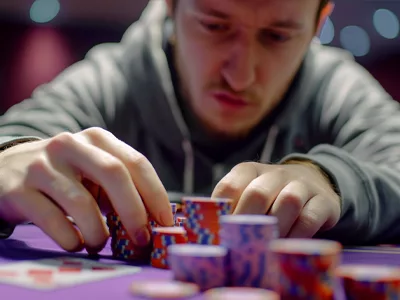The ticket to victory often comes down to bringing your very best when you feel your worst. – David Goggins
If you’re a naturally disciplined person, this article isn’t for you.
For the rest of us—the ones who know the right move at the poker table but still click call when we should fold, the ones who swear we won’t chase losses but light a stack on fire anyways—I’ve got a suggestion:
Figure out how to suffer less, then lean into whatever suffering is left.
A Poker Tale As Old As Time
You know the feeling: You just got rivered in a huge pot where the villain sucked out in a way that lit your nervous system up like a Christmas tree.
Every cell in your body wants to three-bet bluff the same opponent the next time they enter a pot. I’ll show them, you think to yourself. You know it’s the wrong move—that your fold equity is far lower now that the entire table expects you to tilt—and yet you’re about to do it anyways.
This is the moment that separates the pros from the amateurs, and it’s the same mechanism that determines whether you eat that second slice of cake when you’re trying to cut weight or scroll another 100 TikToks when you should be working out. So how do you ensure you make the right call? Once again, discipline-master David Goggins has the answer:
It takes relentless self-discipline to schedule suffering into your day, every day. – David Goggins
The Power of Small Suffering
Forcing yourself to suffer (aka, doing the opposite of what your impulses want) in small doses is one of the best ways to train your mind to resist bad habits. This applies both at the poker table and in everyday life.
If you want to build better habits, don’t start with grand gestures like going to the gym 7 days a week. Instead, start with micro-moments of discipline. See the escalator? Take the stairs. About to check your phone again? Do a couple pushups instead. Every time you override an impulse in daily life, you make it easier to do so in the moments that really matter—like resisting that tilt-induced 3-bet bluff.
The goal isn’t to eliminate suffering. It’s to control when and how we suffer so that it makes us stronger and more resilient.
As you likely know through the repeated experience of pain, poker punishes the undisciplined. If you can’t master your impulses and emotions, the game will teach you suffering in its own unique way. So train your mind now, in moments when it’s easy. Learn to suffer on your own terms, and the next time the impulses of tilt show up, you’ll be battle tested and ready to let it know: not today.

